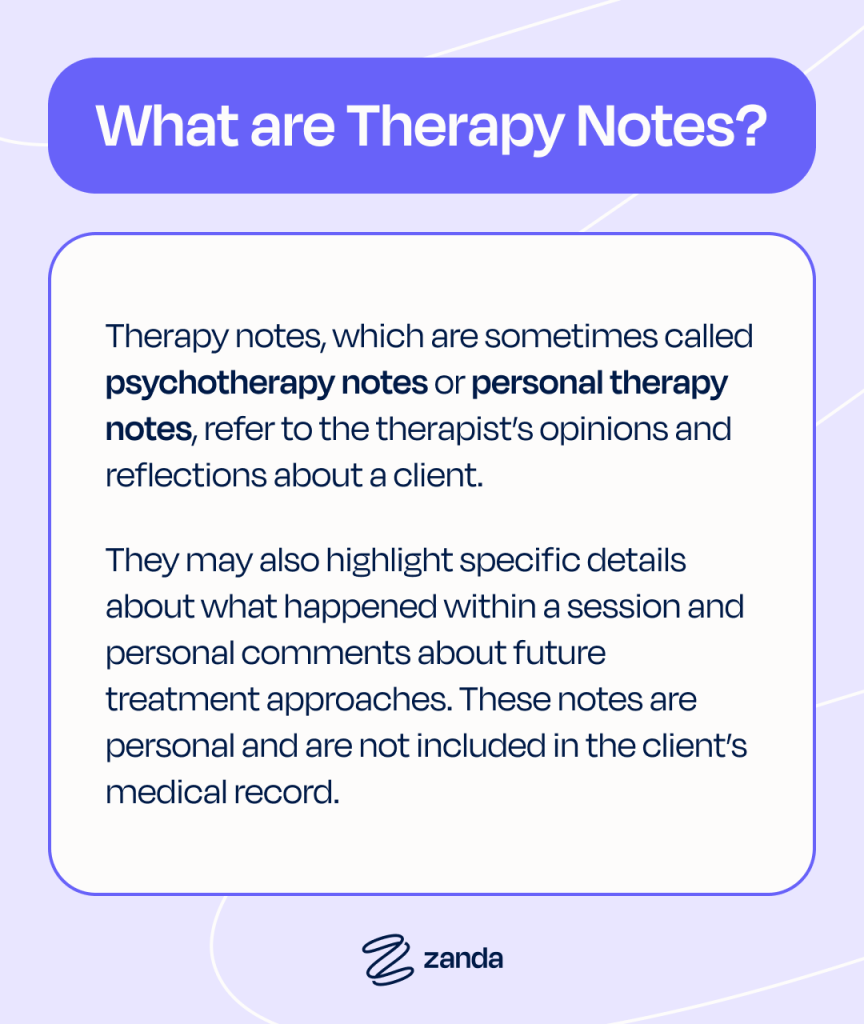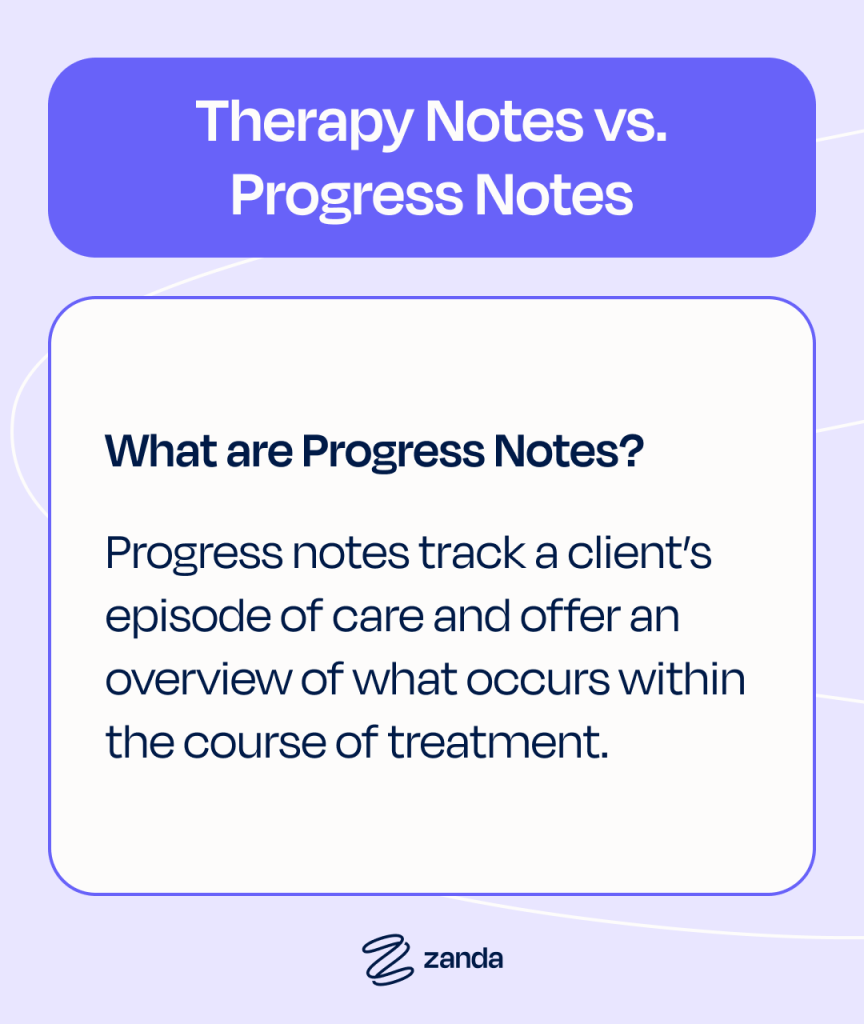This article is written by Nicole Arzt, LMFT
While nobody loves paperwork, documentation is an essential part of comprehensive healthcare. Therapists are required to maintain progress notes for each client, and these notes provide an overview of what’s occurring within treatment. Therapy notes, on the other hand, are personal to the therapist and help providers conceptualize and structure their care accordingly.
While different in purpose, mastering both types of notes can help you better serve your clients.
What are Therapy Notes?
Therapy notes, which are sometimes called psychotherapy notes or personal therapy notes, refer to the therapist’s opinions and reflections about a client. They may also highlight specific details about what happened within a session and personal comments about future treatment approaches. These notes are personal and are not included in the client’s medical record.
Therapy notes vary in type and length, but they may include:
- Particular details about a situation occurring within the client’s life
- Notes about countertransference or transference
- Speculations about a client’s behavior or a potential diagnosis
- Ideas about future interventions or referrals
- Strong emotions that you noted (confusion, anger, fear, protectiveness)
- Questions to ask a supervisor, consultation group, or your own therapist
- Acknowledgments of particular biases toward the client or treatment
- Specific words or images that feel significant to reference at a later point
Therapy notes are held at a high level of protection. In most cases, they are not shared with clients or other healthcare providers. Like writing in a private journal, writing these notes is for your personal growth and introspection. They do not need to be structured or edited in any particular way.
Therapists are not required to maintain therapy notes. That said, because they contain client information, they must be stored confidentially. If you choose to store them electronically, they need to be written separately from progress notes. Similarly, if you maintain paper records, they must be filed in a locked cabinet in a locked office.
What are Progress Notes?
Progress notes track a client’s episode of care and offer an overview of what occurs within the course of treatment. These notes adhere to specific formats and include the following content:
- Date and time of the session
- CPT codes
- Diagnoses
- General description of the client’s mood and presenting symptoms
- Overview of the interventions you employed during the session
- Noted progress related to treatment goals
- Any changes to the current treatment plan
- Notes of crisis concerns or acute symptoms
- Results of clinical assessments
- Medication prescriptions and relevant medication effects
- Follow-up plans for future sessions, referrals, or other actions
It’s generally advised to adhere to a structured format like SOAP (subjective, objective, assessment, plan), DAP (data, assessment, plan), or BIRP (behavior, intervention, response, plan). Some agencies or insurance companies require notes to follow a specified format.
Progress notes are part of a client’s medical record. If your client is using their health insurance to cover the cost of treatment, their insurance company may require accessing these notes to authorize therapy. Some or all notes might also be requested during an audit.
The US federal law indicates clients do not inherently have a right to access their progress notes. However, individual state laws differ on this topic, and if a state law is more protective of the client’s best interest, these local laws often supersede federal laws. Therefore, it’s often best practice to write your notes assuming a client could view them.
You are legally required to securely store your progress notes. Because progress notes contain protected health information (PHI), they must be kept in a confidential location. Only an authorized provider is allowed to access this paperwork. If you’re using an electronic health record, make sure the company adheres to all legal requirements for secure storage.
What are the Main Differences Between Therapy Notes and Progress Notes?
Although the terms are often used interchangeably, therapy notes are intended to help the therapist structure treatment effectively. They are not formal and may include direct quotes, summaries, reflections, conceptualizations, and other interpretations. These notes can help you better remember what happened during a session and prepare for future treatment. They don’t need to be understood by anyone besides you.
Progress notes are intended to track progress and provide an overview of what is being achieved within therapy. These notes need to be clear and professional. This paperwork is far more objective and may be used to warrant insurance coverage, establish a medical diagnosis, or coordinate treatment with other providers.
Purpose: Therapy notes are optional and intended for your introspection and awareness. Progress notes are official treatment documentation noting what is occurring within a client’s episode of care.
Content: While therapy notes tend to be more subjective and hypothetical, progress notes focus more on concrete data, facts, and objective information.
Legal requirements: Both notes are held confidentially, but progress notes may be shared for insurance purposes or due to legal constraints.
Storage: Both notes need to be stored securely, but therapy notes generally receive a higher level of protection. Only the therapist should ever be able to access them. Progress notes, on the other hand, may be shared with other providers or insurance companies via a release of information (ROI).
Are Therapy Notes the Same as Progress Notes?
No, therapy notes and progress notes are very different. Therapy notes contain personal thoughts, narratives, beliefs, and expectations – they are kept away from a client’s file. Progress notes contain concrete information about the client’s treatment and are stored within the client’s medical record.
Legal and Ethical Considerations
A note from our legal eagles: Legal requirements vary significantly by jurisdiction. Ensure that you follow the regulations that pertain to your location and profession. Your professional association is a good place to start.
Therapy notes are typically held in confidence and only accessible to the therapist. These notes are rarely – if ever – subpoenaed or accessed by clients (unless the therapist decides to share them directly). In most cases, insurance also does not have the right to these notes.
For example, in the US, if you receive a court-ordered subpoena for your progress notes, you are required to respond. However, that doesn’t inherently mean you share information. In many cases, it’s important to assert therapist-client privilege on behalf of your client’s well-being (unless your client has already signed a release or waived this privilege).
Due to confidentiality laws, HIPAA-covered providers can only share information specifically requested via a court order (not just an attorney request). If the demand is not valid, you should not release any privileged information. Some demands may appear to be legally enforceable even when they are not. Therefore, it’s considered best practice to consult with your attorney or a representative from your liability insurance before releasing any documentation.
If you must release documentation, it’s typically advised to notify clients (or their legal guardians) that you are required to break confidentiality. Explain which information is being requested and why it’s being requested.
If you believe sharing this data may harm your client, you need to express those concerns and object to the demand based on that belief. Subsequently, you should include a clause about the risk of this occurring within your informed consent forms.
If you need additional guidance on this topic, consult with your professional association. Because state law and licensing board regulations differ, it’s your responsibility to remain current with local legislation.
Conclusion
Although they’re not required, the practice of maintaining therapy notes can support you to become a better clinician. These notes can also help you keep track of small – but important – details about your client’s lives and the content occurring within the treatment.
Maintaining progress notes is a crucial part of any therapy practice. You need to maintain this documentation to keep your profession – and your clients’ well-being – in good standing.
It’s generally a good practice to maintain a consistent format when writing and storing notes. At Zanda, our intuitive practice management software makes it easy to create and maintain confidential client records.
Start a free trial with Zanda today!
Nicole Arzt is a licensed marriage and family therapist and author working in private practice in Orange County, CA. Nicole has worked in various settings throughout her career, including hospitals, schools, nonprofit community health clinics, and private practice.







